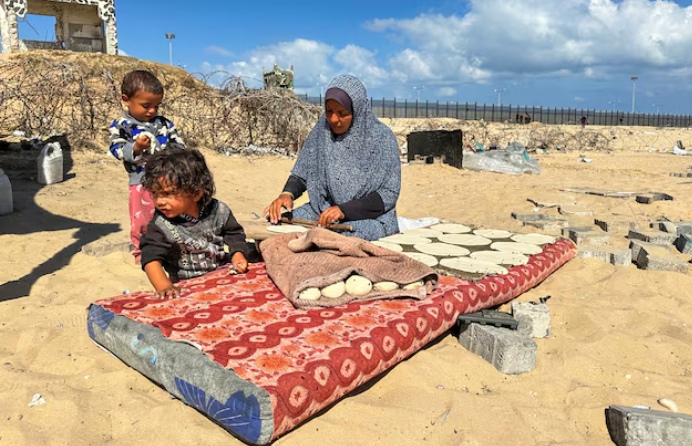Forced displacement has pushed more than a million people to flee the Gaza Strip town of Rafah, the UN agency for Palestinian refugees (UNRWA) said on Monday.
The small town Rafah on the southern edge of the Gaza Strip has sheltered about 1 million Palestinians fleeing Israeli attacks on other parts of the enclave, aid agencies said.
Since early May, the Israeli military has been conducting what it said was a limited operation in Rafah to kill Hamas militants and dismantle infrastructure used by the Palestinian Islamist militant group that rules the Gaza Strip.
The Israeli military ordered civilians to go to an “expanded humanitarian zone” some 20 kilometres (12 miles) away. Many Palestinians complain of suffering Israeli attacks wherever they are, so they have been travelling up and down the Gaza Strip for the past few months.
UNRWA said thousands of families were now living in damaged and destroyed buildings in the town of Khan Younis, where the agency provides basic services, despite “growing difficulties.” The agency also added:
Conditions are unspeakable.
Israeli attack on Syria
An overnight Israeli attack on Syria’s northern province of Aleppo has caused several deaths and damage, with a war monitor saying at least 16 people were killed. A video purportedly taken after the attack and circulated on social media shows large flames shooting out of a building. Israel launched the attack after midnight from a position southeast of Aleppo, a Syrian military source told the state-run Sana news agency on Monday.
Israeli missiles struck areas around the city of Aleppo, causing “several martyrs and some destruction,” the source said.
The UK-based Syrian Observatory for Human Rights said at least “12 pro-Iranian militants” died in an airstrike on the town of Hayyan north of Aleppo, with the attack “causing heavy explosions in a factory.”
“Pro-Iranian groups made up of Syrians and foreigners” control Hayyan, said the Observatory, which relies on a network of sources inside Syria.
Israel rarely comments on the many strikes it has reportedly carried out inside Syria since the start of the civil war in 2011. But it has repeatedly said it will not allow Iran to expand its presence in Syria.
The strikes have targeted Syrian government forces and Iranian-backed militias, including the Lebanese militant group Hezbollah. Last month, Israel struck the coastal town of Baniyas.
Attacks have increased since Israel launched the war in Gaza in response to an attack by the Iran-backed Palestinian militant group Hamas on 7 October.
Alternative to Hamas
Meanwhile, Israel’s security services are working to form a movement in the Gaza Strip alternative to the Hamas group that will govern the enclave, Israeli Defence Minister Yoav Gallant said.
The minister said in an interview with the media:
The security services are preparing an alternative ruling force to Hamas. We will remove the Hamas men and introduce other forces into the isolated areas that will form a new government.
He also stressed that Israel will “never recognise Hamas rule in Gaza.”
The day before, Israeli Prime Minister Benjamin Netanyahu said Israel would not agree to an indefinite ceasefire in the Gaza Strip as long as Hamas maintains its military and administrative capabilities.
On Friday, US President Joe Biden urged Israeli authorities and the Palestinian group Hamas to accept a new truce proposal. The US president explained that the plan consists of three phases. The first phase will last for six weeks: during this time, a truce is established in the Gaza Strip, some hostages held in Gaza are released in exchange for hundreds of Palestinian prisoners, and humanitarian aid supplies are increased.
In addition, the parties will begin negotiations on an indefinite cessation of hostilities during this period. In case the negotiations take more than six weeks, the truce will be extended. At the same time, the mediators – the US, Egypt and Qatar – will make sure that the negotiation process does not reach an impasse.
Under Biden’s proposal, the second phase would require Israel to withdraw all forces from Gaza and Palestinian factions to release remaining hostages. The third phase envisages the launching of a reconstruction plan for the Gaza Strip with the support of the international community.
